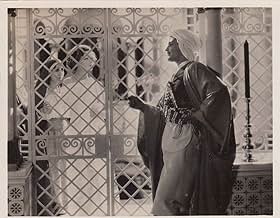An American tourist catches the eye of a disguised Egyptian prince who decides to kidnap her, then try to win her love.An American tourist catches the eye of a disguised Egyptian prince who decides to kidnap her, then try to win her love.An American tourist catches the eye of a disguised Egyptian prince who decides to kidnap her, then try to win her love.
André Cheron
- Hotel Desk Clerk
- (uncredited)
Albert Conti
- Restaurant Manager
- (uncredited)
Adolph Faylauer
- Street Passerby
- (uncredited)
Isabelle Keith
- Train Passenger
- (uncredited)
Alphonse Martell
- Waiter
- (uncredited)
William H. O'Brien
- Butler at Wedding
- (uncredited)
Pedro Regas
- Dragoman
- (uncredited)
Storyline
Did you know
- GoofsWhen Jamil leaves Diana's room via the balcony, a camera shadow is briefly seen moving across the railing under him, at the bottom of the picture.
- ConnectionsReferenced in La casa de las mujeres perdidas (1983)
- SoundtracksLove Songs of the Nile
by Nacio Herb Brown and Arthur Freed
Sung in Egyptian and English by Ramon Novarro (uncredited)
Reprised by Ramon Novarro (uncredited) often
Hummed by Myrna Loy (uncredited)
[Played as background music throughout]
Featured review
It's hard to rate this movie because of the combination of artistic admiration and cultural disgust it evokes. Following new archaeological finds, the elite classes of the U.S. went gaga in the 1920s and early 30s for the anything Middle Eastern, especially Egyptian. At this same time, Europe and the U.S. were in the process of shedding Victorian restrictions and recognizing that women, too, could have sexual feelings. Alas, what was called Orientalism did not stop Americans or Europeans from feeling superior to West Asians, but it did make the latter seem exotic and "romantic." And alas, again, the male film-makers of the time believed that one element of "romance" for a woman was a fantasy that some exotic brute would carry her off by force and ravish her (thus allowing her to express her long-denied sexual feelings). "The Barbarian" is a product of that era, a version of the same fantasy that had been seen in many earlier silent movies, most famously in Rudolph Valentino's "The Sheik." Its artistry is by no means perfect. The technical elements--sets, costumes, cinematography, editing, sound--are fine, but there is a jarring disconnect between the comedy of the first half of the movie and the drama of the second half. Some movies have found the right mix to pull this off (for example, "The Graduate"), but "The Barbarian" is not one of them. The character played by Roman Novarro is initially presented as a lascivious con-artist and later as a particularly annoying hustler (both of which are supposed to be "cute"), which makes it nearly impossible to later accept him as a sincere and honorable hero. The final scene is especially cringe-worthy. On the other hand, Myrna Loy gives an astonishing performance, both as the harassed female of the "comic" first half and in the dramatic second half (though even she can't save the last scene). She remains a believable human being in a role that is about as sexy as any role Loy ever played (and she played a lot of sexy roles). If you think the worst elements of U.S. cultural history are better denounced and rejected than tolerated as appropriate to their times, you will hate this movie. But if you do watch, please do it to mainly to admire Loy's wonderful performance.
- mrnunleygo
- Nov 17, 2019
- Permalink
Details
Box office
- Budget
- $444,399 (estimated)
- Runtime1 hour 23 minutes
- Color
- Aspect ratio
- 1.37 : 1
Contribute to this page
Suggest an edit or add missing content







































